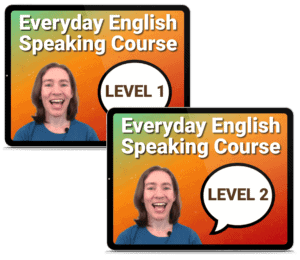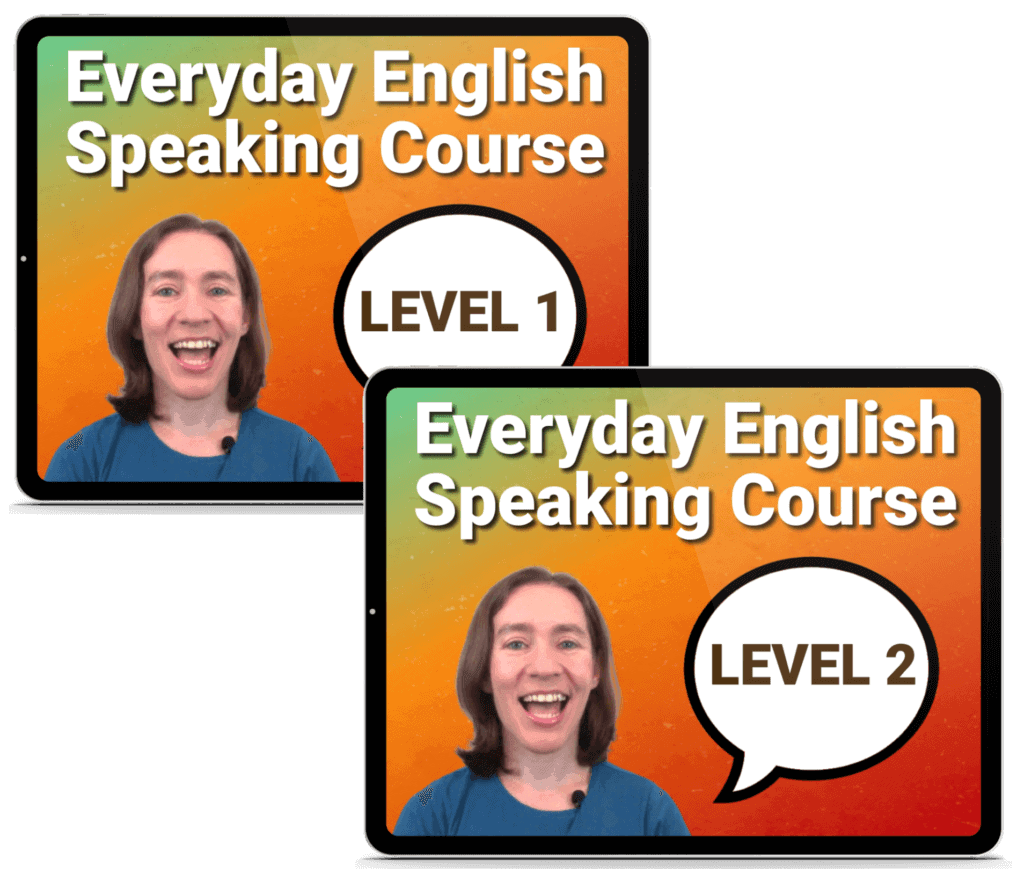
In the last two lessons, you learned how to start a conversation and how to continue a conversation in English. Now it’s time to learn how to bring conversations to an end in a polite and positive way!
First, I want to invite you to join my Everyday English Speaking Courses if you’re serious about improving your speaking. These courses include lessons teaching you common phrases that native English speakers use.
They also have homework in the form of “speaking tasks” – you can record yourself talking and send it in for evaluation by our teaching team! This is a really great way to get direct feedback on your spoken English and find out what you’re doing well and what needs improvement.
All right, when it comes to ending a conversation in English, there are just two tips I want you to remember:
2 Keys for Ending a Conversation in English
1. SMILE! Be friendly when ending the conversation, so the other person knows you enjoyed the conversation – and doesn’t think you’re ending the conversation because you’re annoyed.
2. Make a positive comment, then say you need to go, or give a reason for ending the conversation.
Ending an Informal Conversation:
Conversation 1:
“Hey, it was nice talking to you, but I’ve gotta run.”
“OK, no problem. Have a good one!”
“You too – bye!”
“I’ve gotta run” is an informal expression to say “I need to go.”
Conversation 2:
“Well, I’d love to keep chatting, but I have to head out – my yoga class starts in an hour.”
“Oh, enjoy your class!”
“Thanks! See you later.”
“head out” means “leave” or “go”
Conversation 3:
“Thanks for the book recommendations, I’ll definitely have to check them out. Anyway, I actually need to go pick up my kids from school.”
“All right – take care!”
Notice how all three conversations use a “transitional” word like “Hey,” “Well,” or “Anyway” to introduce the end of the conversation.
To give your reason for leaving, you can say “I have to / I need to / I’ve gotta” – these express obligation, so they introduce the next thing you need to do and the reason why you’re ending the conversation.
Ending a more formal conversation (at work):
Conversation 1:
“Okay, so I’ll call the distributors while you prepare the contract, and we’ll touch base next week.”
“Sounds like a plan!”
“Great! Have a good afternoon.”
“Thanks, you too. Bye.”
“Bye.”
You can end a conversation at work by giving a summary of the conversation or the next actions to take. This gives the other person a signal that you would like to end the conversation.
“Anyway, I should get back to work.”
“Yeah, me too. See you later.”
“I should get back to work” is a good way to end a conversation with a co-worker that is not related to work – for example, if you are chatting with your colleague about weekend plans or other interests.
“Well, I know you’re busy, so I don’t want to keep you.”
“That’s OK. Nice talking to you.”
“I don’t want to keep you” is a way to say that you respect the other person’s time, so you won’t continue the conversation for hours and hours. This also signals that the conversation is coming to an end. It is often used during phone calls.
Here are a few more phrases that show you enjoyed the conversation, but now you’re bringing it to an end:
-
- It was nice talking to you.
- I’m glad we got a chance to talk.
- Good seeing you / Good talking with you.
(say this to end a conversation with someone who you’ve just met or just been introduced to for the first time)
- It was great to see you again / reconnect. So nice to catch up with you! (say these when you see someone again, especially after some time has passed. “Catch up with you” in this context means to find out each other’s news and updates)
- Thanks for taking the time to talk with me. (more formal – say this to a busy/important person to express gratitude for spending their time talking with you)
Different ways to say “goodbye” in English
Formal or informal:
- Bye / Bye-bye
- See you soon!
- See you later
- Take care
- Have a good one!
- Have a nice day!
- So long
Informal only:
- Take it easy
- Catch ya later / Check ya later
- Later!
- I’m off / I’m out
I hope you enjoyed this lesson – and I hope to see you inside my Everyday English Speaking Courses. I say “courses” because there are actually two courses – Level 1 which focuses more on practical daily situations, and Level 2 which has more advanced conversations and expressions.
Anyway, it was nice talking to you – I’ll catch ya later!


